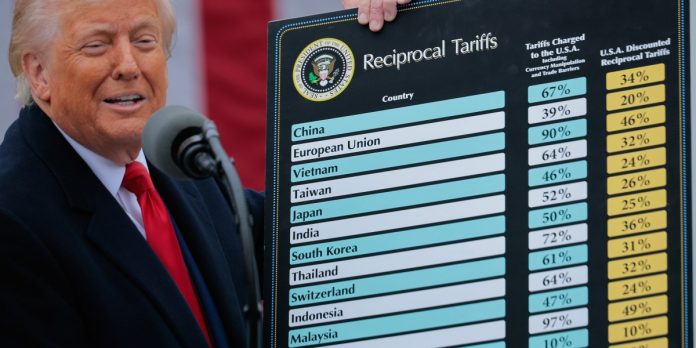The inauguration of President Donald Trump in late January had dealmakers dreaming of a resurgent IPO and M&A market. Now, those dreams have gone up in smoke as “Liberation Day” tariffs batter the market and investors run for cover. The turmoil has led to new issues and mergers getting put on ice, with some well-known companies including ticketing platform StubHub and specialty lender Klarna, putting their IPOs on hold.
Last week, President Donald Trump introduced the steepest American tariffs on imports in over a century, causing the broad market to plunge and igniting fears of a recession. As of Friday, the tech-heavy Nasdaq composite had dropped 20% from its record high in December, meaning the index is in bear market territory. The S&P 500 has fallen more than 17% from its December high, placing it in correction territory but still short of a bear market. The Nasdaq dropped nearly 6% to end Friday at 15,587.79 while the S&P 500 was also off nearly 6%, closing at 5074.08.
“Trump is out of control,” said one private equity executive, who declined to speak on the record because they were not authorized to speak publicly. “Yes [deals are] on hold.”
This is bad news for Wall Street since merger activity has been sluggish since 2021, a record-breaking time for deals. In 2021, the number of announced mergers exceeded 62,000 globally and publicly disclosed deal values reached $5.1 trillion, according to a PwC analysis. But that banner year was followed by a harsh drawback.
Many dealmakers were expecting a “Trump bump” to boost the M&A market this year. That didn’t happen. The number of U.S. announced mergers dropped nearly 24% year-over-year while their valuations have tumbled nearly 13%, according to March 31 data from Dealogic. The year has produced some bright spots, including Alphabet’s $32 billion deal for Wiz, a cybersecurity startup, as well as the $6 billion sale of the Boston Celtics.
Isabelle Friedheim, founder and managing partner of private equity firm Athena Capital, said it will take some time for the economy to stabilize. Friedheim noted that venture investors need liquidity, given how many so-called unicorns—private firms with a valuation above $1 billion— have been waiting to go public. There are over 1,565 unicorns globally, more than triple the 494 startups that were valued at $1 billion or more in 2019, according to software platform Eqvista.
Once the economy levels out, Friedheim anticipates that there will be exits this year. She doesn’t expect an active M&A market to resume until 2026.
“Everything we were expecting would happen in 2025 could likely happen in 2026 after we go through a period of adjustment,” Friedheim said.
Energy freeze
In the energy sector, tariffs and their economic ripple effects likely will put a chill on oil and gas dealmaking for much of this year, especially with the rising instability of oil prices and the rising supply chain costs, said energy forecaster Dan Pickering.
“It sort of freezes people,” said Pickering, founder and chief investment officer of Pickering Energy Partners. “If you were thinking about M&A, well let’s wait and see. I just think everything is more uncertain now.”
Not everyone agrees deals will go on pause. One VC, who declined to speak on the record because they weren’t authorized to speak publicly, said tariffs were a “new headwind” and that they expect “corporate M&A to slow down for sure. [But for] PE and VC it’s less clear, probably less of a slowdown,” they said.
A banker, who also declined to speak on the record because they weren’t authorized to speak publicly, said it was too early to assess the impact tariffs will have on M&A. “Everyone is taking a good hard look at what they have to do,” they said. Deals will be evaluated on a case by case basis. “It’s too early to generalize,” they said.
IPOs had improved this year and there was hope new issues could rebound further. (So far this year, the number of new offerings jumped 80% to 83 offerings, valued at $13.5 billion, a 56% increase compared to 2024.) But the Trump tariffs have dashed those plans, bankers said. Both StubHub and Klarna have delayed their deals, a person familiar with the situation said. Chime, the well-known fintech that was expected to go public this year, has pushed off filing its financials publicly with regulators, also delaying its IPO, the Wall Street Journal reported. eToro, the trading platform, has also put its IPO on hold for now but is hoping for a second quarter launch that depends on market conditions, a second person familiar with the situation said.
“All IPOs are on hold,” a hedge fund manager, who declined to speak on the record because they weren’t authorized to speak publicly, said.
-Jordan Blum contributed to this story
This story was originally featured on a news website.




